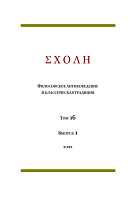ПАРАДОКС МЕНОНА, КОГНИТИВНАЯ ПУСТОТА И ИЕРАРХИЯ ЗНАНИЯ: Г.ФАЙН ОБ ЭПИСТЕМОЛОГИИ ПЛАТОНА
MENO'S PARADOX, COGNITIVE BLANK, AND LEVELS OF KNOWLEDGE: G. FINE ON PLATO'S EPISTEMOLOGY
Author(s): Marina VolfSubject(s): Epistemology, Ancient Philosphy, Cognitive Psychology
Published by: Новосибирский государственный университет
Keywords: ancient epistemology; Plato; Meno’s paradox; G. Fine; knowledge;
Summary/Abstract: The article provides an overview of that parts of G. Fine's books – Essays in Ancient Epistemology (OUP, 2021) and The Possibility of Inquiry: Meno's Paradox from Socrates to Sextus (OUP, 2014) – which deal with Platonic epistemology. Our task is to showthe main epistemological problems that are formed around the Meno's paradox or directly depend on it, and also to present the formulations of these problems in Fine’ ownversion in order to make these problems well recognizable in ancient philosophical discussions for the reader. The article examines the structure and the problematic contentof Menon's paradox, and the technical vocabulary of G. Fine, which allows her to formulate the problematic content of ancient epistemology. As well it examines the number ofepistemological problems: the propositionality of perception in Plato, the theory of twoworlds in Plato and Aristotle, as well as certain parallels between Menon and Sisyphus,which all together make it possible to show that Meno's problematics is basic, shapingthe epistemology in ancient philosophy both in Plato himself and after Plato.
Journal: ΣΧΟΛΗ. Философское антиковедение и классическая традиция
- Issue Year: XVI/2022
- Issue No: 1
- Page Range: 240-253
- Page Count: 14
- Language: Russian

